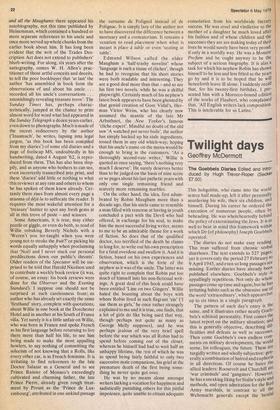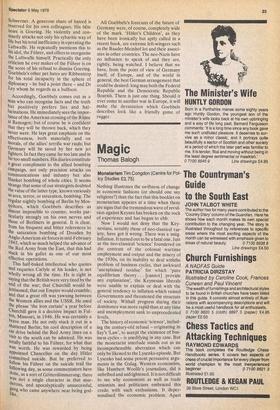Twilight days
Geoffrey McDermott
The Goebbeis Diaries Edited and introduced by Hugh Trevor-Roper (Secker £7.50)
This hobgoblin, who came into the world scarce half made-up, left it after personally murdering his wife, their six children, and himself. During his career he ordered the execution of numerous people, often bY beheading. He was wholeheartedly behind the policy of exterminating the Jews. It is as well to bear in mind this framework within which Dr (of philosophy) Joseph Goebbels operated.
The diaries do not make easy reading. This man suffered from chronic verbal diarrhoea. The text extends to 327 pages; yet it covers only the period 27 February to 9 April 1945, and even so long passages are missing. Earlier diaries have already bee° published elsewhere. Goebbels's style is appallingly repetitious. Not only do whole passages come up time and again; but he has irritating habits such as the obsessive use of the word 'extraordinary', which appears but up to six times in a single paragraph.
The pattern of each day's entry is the same, and it illustrates rather neatly Goebbels's schizoid personality. First comes the latest report on the military situation; and this is generally objective, describing difficulties and defeats as well as successes. Then come Goebbels's own endless coinments on military developments, the world scene, his colleagues, the future. These are turgidly written and wholly subjective: gen"
• erally a combination of hatred and euphoria in all directions. Of course he hates the allied leaders: Roosevelt and Churchill are 'war criminals' and 'gangsters'. However; he has a sneaking liking for Stalin's style an° methods, and open admiration for the Red Army marshals, in contrast to all the Wehrmacht generals except the bestial Schwerner. A generous share of hatred is reserved for is own colleagues. His bete noire is Goering. He violently and constantly attacks not only his sybaritic way of life but his total inefficiency in operating the Luftwaffe. He repeatedly mentions this to his idol, the Fiihrer, and offers to reorganise the Luftwaffe himself. Practically the only criticism he ever makes of the Fiihrer is on the score of his refusal to dismiss Goering. Goebbels's other pet hates are Ribbentrop for his total incapacity in the sphere of diplomacy — he had a point there — and Dr Ley whom he regards as a buffoon.
Accordingly, Goebbels comes out as a Man who can recognise facts and the truth but positively prefers lies and hallucinations. He immediately sees the importance of the American crossing of the Rhine at Remagen; but of course he is confident that they will be thrown back, which they never were. He lays great emphasis on the effectiveness, both materially and on Morale, of the allies' terrific war raids; but Germany will be saved by her new jet fighters. In fact they came far too late and in far too small numbers. His diaries constitute a great compliment to the allied bombing caMpaign, not only precision attacks on communications and industry but also blanket bombing of whole cities. It seems strange that some of our strategists doubted the value of the latter type, known variously as area, terror, or saturation, bombing. The regular nightly bombing of Berlin by Mosquitoes, which Goebbels describes as almost impossible to counter, works particularly strongly on his own nerves and those of Berliners in general. It is clear, from his frequent and bitter references to the saturation bombing of Dresden by Anglo-American air forces in mid-February 1945, which so much helped the advance of the Red Army from the East, that this had stuck in his gullet as one of our most effective operations.
This half-baked intellectual who quotes and requotes Carlyle at his leader, is not Wholly wrong all the time. He is right in saying that the British were very tired by the end of the war; that Churchill would be Jettisoned; that our Empire would crumble; and that a great rift was yawning between the Western allies and the USSR. He used the phrase 'the iron curtain' a year before Churchill gave it a decisive impact in Ful t°n, Missouri, in 1946. He was certainly a brave man. He not only stuck it out in a Shattered Berlin; his cool description of a car drive behind the Red Army lines on a visit to the south can be admired. He was totally faithful to his Fiihrer, for what that Was worth. He was rewarded by being appointed Chancellor on the day Hitler committed suicide. But he preferred to
follow his Fiihrer on the suicide trail the f°1lowing day, as some commentators have
done, as a sort of Gotterdammerung; there Was not a single character in that murderous, and apocalyptically unsuccessful, gang who came anywhere near being god like. All Goebbels's forecasts of the future of Germany were, of course, completely wide of the mark. 'Hitler's Children', as they have been ironically but aptly called in a recent book, are extreme left-wingers such as the Baader-Meinhof lot and their associates in other countries. The neo-Nazis have no influence to speak of and they are, rightly, being watched. I believe that we have, from the point of view of Germany itself, of Europe, and of the world in general, the best German arrangement that could be desired: long may both the Federal Republic and the Democratic Republic flourish. There is just one thing. Should it ever come to another war in Europe, it will make the devastation which Goebbels describes look like a friendly game of rugger.







































 Previous page
Previous page